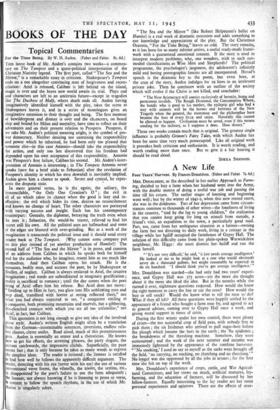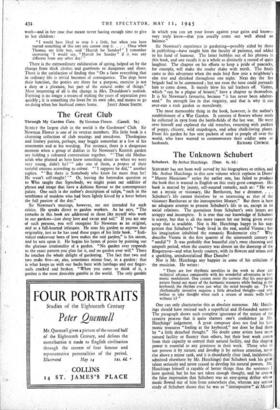A New Life
Four Years' Harvest. By Frances Donaldson. (Faber and Faber. 7s. 6d.)
MRS. DONALDSON, as she described in her earlier Approach to Farm- ing, decided to buy a farm when. her husband went into the Army, with the double motive of doing a useful war job and passing the time till his return. The earlier stages of learning and beginning went well ; but by the winter of 1941-2, when this new record starts, she was in the doldrums. Part of her depression came from circum- stances common to thousands of other wives—the loneliness of living in the country, " tied by the leg to young children," the realisation that you cannot keep going for long on stimuli from outside, a friend's visit, an expedition to the town, a particularly good mail. Part, too, came from her ambiguous situation as a farmer—owning the farm but not directing its daily work, living in a cottage in the village while her bailiff occupied the farmhouse of Gypsy Hall. The solution of this difficulty came from her plain-spoken Warwickshire neighbour, Mr. Higgs: she must dismiss her. bailiff and run the farm herself.
" It's not very difficult,' he said, ' it just needs average intelligence.' He looked at me as he might look at a cow who would obviously never do a thousand gallons, but might reasonably be expected to do six hundred. I should think you've got average intelligence.'" Mrs. Donaldson was startled—she had only had two years' experi- ence, and Gypsy Hall was 375 acres—yet the more she thought about it the more she liked the idea. But in the months while she turned it over, nightmare questions recurred. How would she know the right moment to carry the hay or cut the corn? How would she buy or sell stock? Would she know what to tell the men to'do? What if they all left? All these questions were happily settled by the appearance of a friend who bought a farm near by, and agreed to act as general adviser, coming over to Gypsy Hall once a week, and giving moral support in times of crisis.
During the first winter under her own control, there were plenty of crises—the too successful crop of field peas, with nobody free to pick them ; the six Irishmen who arrived to pull sugar-beet before the plough which loosens the beet in the earth ; the 'flu epidemic ; the breakdowns of the threshing machine. Somehow, they were surmounted ; and the work of the next summer and autumn was immensely lightened by the appearance of the combine harvester. " ' No stooking,' I used.to say to myself as the sacks were brought off the field, ' no carrying, no stacking, no thatching and no threshing.' " No longei was she oppressed by all the jobs in arrears ; for the first time she felt on top of the work.
Mrs. Donaldson's experience of crops, cattle, and War Agricul- tural Committees, and her views on muck, artificial manures, ley- farming, and the education of farmers, will be discussed by her fellow-farmers. Equally interesting to the lay reader are her more personal experiences and opinion'. There are the effects of over- work—and in her case that meant never having enough time to give to her children:
"I would have liked to stop it a little, but when you have started something of this sort you cannot stop it. . . Once when Thomas, my little boy, said 'Hurrah for Sunday! I remember answering ' I would say, " Hurrah for Sunday " if it was any different from any other day.'"
There is the extraordinary exhilaration of spring, helped on by the change from thick clothes and gumboots to dungarees and shoes. There is the satisfaction of finding that " On a farm everything that in ordinary life is trivial becomes of consequence. The dogs have their function, the ponies are there for a purpose, exercise is not a duty or a pleasure, but part of the natural order of things." Most interesting of all is the change in Mrs. Donaldson's outlook. Farming is no longer a means of making the years of separation pass quickly ; it is something she loves for its own sake, and means to go on doing when her husband comes home. JANET ADAM SMITH.























 Previous page
Previous page